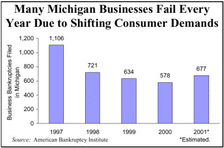
A business writer at one of Michigan's largest daily newspapers recently denounced corporations, blasting "capitalistic greed" and ruthless layoffs by businesspeople who apparently relish giving out pink slips. Like many other critics of business, the writer implies throughout her screed that corporations, almost by definition, are run by evil people.
But here's a dirty little secret about capitalism: consumers, not corporations, run the show. If you find something about the marketplace objectionable, it would be more appropriate to blame those who actually call the shots: the ruthless, cutthroat, and disloyal American consumers.
Don't believe it? Ask a large corporation, Coca-Cola, about the power of consumers when it introduced "New Coke," and the product promptly flopped. Then talk to the owners of the more than 600 Michigan businesses that filed for bankruptcy in 2001 and ask them who controlled their destiny? Then visit the International Supermarket Museum in New York, and view the 60,000 products that have failed in U.S. supermarkets, a convincing testament to what economists call "consumer sovereignty."
Consumers are the kings and queens of the market economy, and ultimately they reign supreme over corporations and their employees. When corporations make mistakes and introduce products that consumers don't want, which happens frequently, you can count on consumers voicing their opinions forcefully and immediately by their lack of spending.
What about the corporate layoffs the business writer calls "callous" and "nefarious"? Corporations may issue the actual pink slips—and sometimes there might be a more compassionate time and way to do it—but consumers are ultimately responsible for the layoffs, too. For example, consumers abandoned American-made cars in the 1970s in favor of Japanese-made Toyotas and Hondas. General Motors subsequently had to lay off Michigan workers because of the decline in sales.
Who got the blame? "Greedy" corporations, as usual. The greedy Japanese automakers were blamed for taking sales and market share from American automakers, and greedy GM was blamed for laying off workers to salvage profits.
But if American consumers hadn't been so greedy themselves in their concern about quality and low prices, those layoffs wouldn't have happened. Had consumers tolerated high prices, low quality, and poor service, they would have loyally continued to buy expensive, poorly built American cars. Instead, in the name of getting maximum value, consumers abandoned U.S. automakers in favor of low-priced Japanese cars, forcing GM to lay off workers.
Another oft-cited example of corporate greed is Wal-Mart's practice of opening up stores in small towns around the country. Usually located on the outskirts of town, Wal-Mart must compete against existing downtown merchants. Wal-Mart is at an initial disadvantage because it is new to town, and the downtown stores have been around for generations in many cases. However, Wal-Mart has one effective weapon to attract customers away from the downtown merchants: low prices. After several years, the usual story is that Wal-Mart "has driven downtown merchants out of business with its low prices." But Wal-Mart can't force people to shop at its stores; all it can do is offer a low-priced alternative to the high-priced downtown merchants. "Greedy" consumers do the rest.
In a market economy, it is consumers, not businesses, who ultimately make all of the decisions. When they vote in the marketplace with their dollars, consumers decide which products, businesses, and industries survive—and which ones fail. It is therefore consumers who indirectly but ultimately make the hiring and firing decisions, not corporations. After all, corporations can make no money, hire no people, and pay no taxes unless somebody, sooner or later, buys their products.
Of course, I don't mean to denigrate my fellow bargain hunters by my tongue-in-cheek use of the phrase "consumer greed." What consumer sovereignty in a free marketplace translates into is each person husbanding his resources for the greatest benefit to himself and his family, which in turn translates into the greatest efficiency in the consumption of the world's scarce resources.
If you don't like the message of the marketplace, don't assume that corporations and greed are to blame while consumer behavior plays no role in the outcome. We should be thankful, in fact, that the marketplace puts consumers on such a powerful pedestal.

The Mackinac Center for Public Policy is a nonprofit research and educational institute that advances the principles of free markets and limited government. Through our research and education programs, we challenge government overreach and advocate for a free-market approach to public policy that frees people to realize their potential and dreams.
Please consider contributing to our work to advance a freer and more prosperous state.